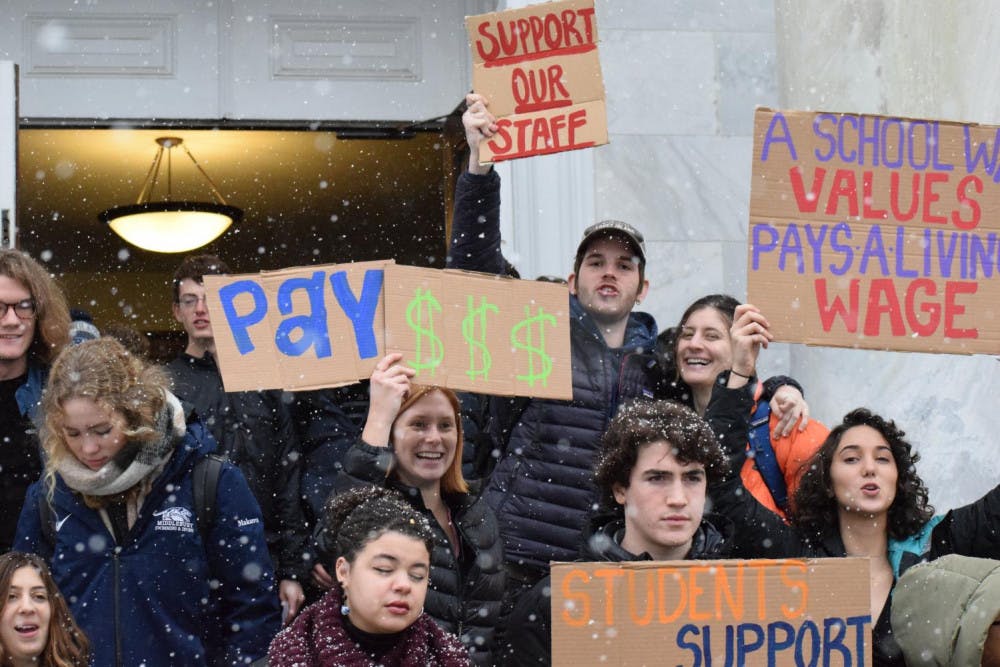Falling snow and the impending threat of finals did not deter over 200 students from gathering in Mead Chapel on Thursday to rally in support of higher wages for Middlebury facilities and dining staff.
Students Celia Gottlieb ’21.5 and Connor Wertz ’22 organized the protest, along with the rest of their Race, Rhetoric and Protest class, taught by Professor of Writing and Rhetoric James Sanchez.
“The people who make our food, clean our buildings and maintain the school are vital to having a functional institution,” Gottlieb told The Campus. “Their work is of the utmost value, yet their wages do not reflect this. They dedicate a significant portion of their days to making sure we can live our lives, yet, they don’t make a living wage to live theirs.”
The protest began with a sea of students stomping and yelling, the clamor rising to a crescendo before ending with a thunderous clap. After addresses from the student organizers, protesters marched to each dining hall and posted messages of gratitude to the staff on pieces of paper, with the heading “Students value the hard work of Middlebury staff. Pay them a living wage.” Around campus, students wore all black to demonstrate solidarity.

According to an article about low staff wages from The Campus’s January Staff Issue, 15% of staff fill the college’s lowest paying positions, in the Operations Level 1 and 2 pay bands (OP1 and OP2). OP2 positions begin at $12.07 per hour, and OP1 positions begin at $11 per hour.
These wages often fall below the estimates for what constitutes a living wage in Addison County. In an October article about custodial staffing shortages, The Campus reported that the Vermont Legislative Joint Fiscal Office found the 2018 livable wage for the state to be $13.34 per hour. A 2018 study by the National Low-Income Housing Coalition set the Addison County housing wage at $19.63 per hour.
Staff receive yearly raises, which the college calculates based off annual increases in living expenses. But for staff earning low wages without disposable incomes, changes in a single factor, like an increase in the price of the gas they need to commute to work, could throw their entire budget off balance, according to Tim Parsons, the college’s landscape horticulturist and Staff Council president.
At the protest, many students asserted that this precarious balance between financial security and insecurity is unacceptable.
“When the same people that we ask to feed us need food stamps to feed their own family, when the same people that we ask to keep our dorm rooms warm need to use emergency Chaplain’s Funding to heat their own homes in the winter, that is a problem,” Wertz said to the crowd.
“When I say thank you, you say staff, thank you, staff!” pic.twitter.com/7YqeVD6RKk
— Benjy Renton (@bhrenton) December 5, 2019
Meeting market rates
In July 2019, the college hired Mercer, a human resources consulting group, to conduct a study of wages across different positions at the state, NESCAC college and national levels to find the market rates for these positions, partly in response to increased turnover in recent years in OP1 and OP2 positions.
The administration has asked that the group prioritize positions in these bands. It hopes to receive that data by January so it can include any wage increase in the 2021 fiscal year budget beginning in July 2020.
The data for the rest of the positions should be ready by July, according to David Provost, executive vice president for finance and administration and treasurer.
“Related to the recent issues around staff, especially those in OP1 and OP2, we feel a need to address that sooner rather than later … If we make that a priority, I don’t believe that it will be difficult to fix that quickly,” said Provost, who was also dressed in all black on Thursday to show support for the staff and the protest.
Provost said the administration cannot fully commit to following Mercer’s eventual recommendations at this time. The administration also cannot say what it will do should the market rate come out lower than the estimated living wage.

Two and a half hours before the protest began on Thursday, the administration sent an email to all staff, students and faculty commending the protesters and reaffirming that it will look into adjusting wages as necessary.
“We endorse this student action and want to reiterate that a top priority for Middlebury administration is to pay, at the very least, the market rate for full-time entry-level positions,” administrators wrote. The email was signed by Provost, Vice President for Student Affairs and Dean of Students Baishakhi Taylor and Vice President for Human Resources and Chief Risk Officer Karen Miller.
“I think the administration has been very smart and logical about their goals, but it doesn’t necessarily speak to the values of the institution,” Parsons said. “Market rate compensation is a good goal. I think living wage is more of a value.”
“I’m happy with the fact that the administration is open towards change and supportive of increasing wages, but I believe that we won’t really be respecting our workers until a living wage is paid,” Wertz told The Campus.
The administration plans to assemble a group of faculty, staff and students to help create the 2021 fiscal year budget. Finding the money to increase staff wages could require some reconsideration of campus priorities, according to Provost.
“We hear from the staff, ‘Yeah, we have an incredible benefit program, but benefits can’t feed my kids.’ I think it will be interesting if the faculty and staff want us to look at their benefits. I think we should,” Provost said.
The administration is also trying to determine the best schedule on which to conduct compensation reviews regularly so that the wages do not fall behind the market rate in the future, according to Provost.
“I want to see market rate pay keep up year after year. As market rate goes up, we're falling down,” Parsons said. “Part of what I would like to do in the next year is really work with administration so that we don’t go through this again ... I really want to see policies in place to keep compensation at market rate if market rate is the best that we can do.”
According to Parsons, student organizing and Campus coverage were instrumental in getting the administration to prioritize the issue of staff wages. In October, The Campus published an article about facilities staff efforts to unionize, following a controversial workforce planning process. Although dining staff were not among those pushing to unionize, some dining jobs, including checker and part-time servery positions, do fall in the lowest pay bands.

“We’ve been saying this for two or three years, but it took student action to get the college to address it … I don’t think they would have sent that email without [the protest],” Parsons said.
Student organizers plan to continue campaigning on behalf of staff if their conditions do not improve, according to Gottlieb and Wertz.
Staff also participated in Thursday’s demonstration. At least two facilities staff were at the Mead Chapel rally. Cooks at all three dining halls wore all black to show support. The protests ended at Proctor, where students were greeted with hot chocolate and a message from the dining hall staff that read, “Thank you for supporting us in all we do. It means more than you know.”
“It’s amazing that the students would think to protest for us. It’s really touching,” said Machelle St. Pierre, a servery employee who has worked at Middlebury for 20 years.
“It brings tears to the eyes. It makes it all worth it.”
[gallery size="medium" ids="47789,47788,47792,47793,47790,47791"]

Sophia McDermott-Hughes ’23.5 (they/them) is an editor at large.
They previously served as a news editor and senior news writer.
McDermott-Hughes is a joint Arabic and anthropology and Arabic major.
Over the summer, they worked as a general assignment reporter at Morocco World News, the main English-language paper in Morocco.
In the summer of 2021 they reported for statewide digital newspaper VTDigger, focusing on issues relating to migrant workers and immigration.
In 2018 and 2019, McDermott-Hughes worked as a reporter on the Since Parkland Project, a partnership with the Trace and the Miami Herald, which chronicled the lives of the more than 1,200 children killed by gun violence in the United States in the year since the Marjory Stoneman Douglas High School shooting in Florida.




